Last Updated on March 24, 2023 by Lorna Barrow

No small business owner wants to have to deal with a crisis.
But if you’re fortunate to remain in business, you will have to deal with one, sooner or later.
When you do, which skills will you rely on? I bet you’ve never thought about this before…
Let me show you why it’s important to prepare in advance.
Right now, the world has been turned upside down by the Caronavirus and we can’t pretend it’s anything else but serious. This means you’re completely laser-focused on protecting yourself and your loved ones.
But somewhere in your life, there’s a business that supports your family, powered by workers who have also become “family”. So, you need your business to survive and even thrive in any crisis.
Well, to make sure that this happens, there are 7 critical business skills you will want to rely on. Let me tell you a little about these skills, before I share them with you.
First, they’re interpersonal or people skills which are essential for your role as a leader. Then, the more you use them, the better you become at them. In this way, you’re setting yourself up to be in business for a long time.
But in a crisis, they are invaluable. They enable you to read a situation, make a sound judgement on how it must be handled and communicate your position to your team. Along with these skills, here are 7 simple easy steps you can take to help you make money in a crisis.
Now that I have your attention, let’s dive right into your 7 skills.
1. Leadership

Your capacity to demonstrate leadership is the most important step towards preventing a crisis from becoming a disaster.
I mean that. All the other skills are really just support skills.
Highfalutin definitions aside, leadership is simply how you get things done through people. But at the same time, you are the person they will turn to for guidance, especially in difficult times.
To demonstrate “finest hour” leadership skills, you first have to narrowly identify the context of the crisis. This is critical, if you’re to truly motivate your team to manage the difficult situation.
For example, very early on in my Rapid Scale Leadership Programme, participants have to work out the context in which their businesses operate, before we decide how best they can lead it.
Next, to get things done effectively through your people in a crisis, you have to understand the importance of influence to leadership. But even more importantly, you have to know the extent of YOUR influence and how best to exploit it.
Now you’re longing for a simple definition of “influence.” Let me help you. Simply stated, influence is how you move someone from resistance, to compliance, to commitment.
In a crisis, if you can do this and how you do it, makes all the difference…
2. Adaptability/Flexibility
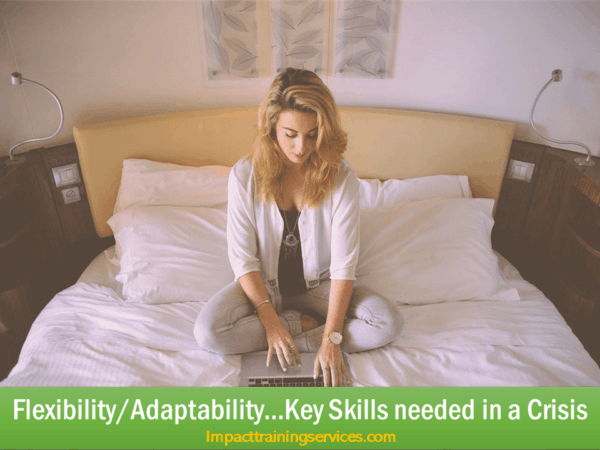
I know one and you know one.
That person who is so inflexible. So completely unable to adapt to anything, you check to see if they are cemented in place. My grandfather used to be like that. But my grandfather never managed a business and my simple grandmother was his only crisis.
You know one and I know one.
That person who can analyse a situation and quickly adjust their responses to deal with this changing or challenging situation. Yeah…that’s who I mean…the one with the adaptability skills. What’s more, they do so smoothly, without experiencing any significant setbacks.
As a matter of fact, a BIG benefit of a small business is being flexible and adaptable, able to respond to almost anything, faster than the nearest, cumbersome corporation.
Just imagine what these skills will do for you in a crisis…
With these skills to rely on, you can transform a potential bad situation by easily pivoting to a new, alternative solution.
Can you picture that?
So, brush up on these skills because you team will be depending on you for reassurance, guidance, and a sense of stability in a crisis.
Being adaptable and flexible will save you from disappointing them.
3. Problem-Solving/Decision-making
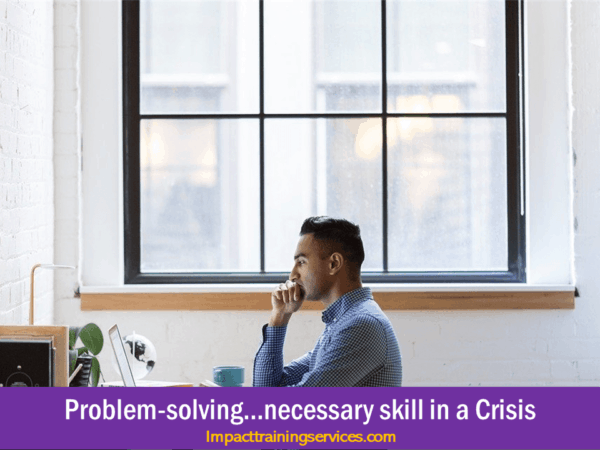
In a nutshell, problem-solving is the process of identifying and describing a problem, determining its cause, considering alternative solutions and choosing and implementing the best one.
Do you have an established process for problem-solving and decision-making?
I hope you do because in a crisis, all types of problems come at you very, very fast. When this happens, you find yourself “putting out the short-term fires” over and over. What’s worst, you actually believe you’re fixing the real problem.
Now, this is where having problem-solving skills and a decision-making process are invaluable. You see, once you have then, you can deploy them at an accelerated pace, as you take full control of the situation.
A word of caution, though.
Just because you have a process, that’s no reason to follow it like your shadow follows you. You must still be flexible enough to come up with creative and unorthodox solutions and confidently implement these.
4. Positivity
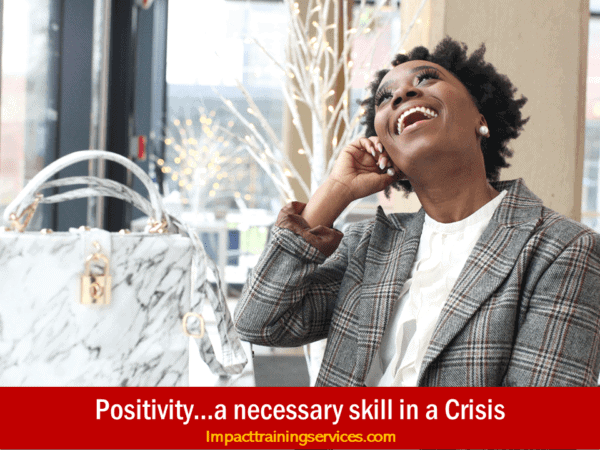
“Positivity? A skill? Here I was, thinking it was a virtue all along!”
Simply put, positivity is having an optimistic attitude in a difficult situation.
It’s okay if you think of it as a virtue, as long as you understand it’s a skill which you can and should learn, as part of your leadership toolbox.
Yeah…learn it, own it and rely on it in a crisis.
When you do, you are able to mentally acknowledge the complexities in any situation. But at the same time, you’re confident and courageous in your approach to solving the problems.
This attitude motivates your team members to perform at their best, easily going beyond established standards to achieve incredible results.
Because of your positive attitude, people are more willing to offer you ideas, suggestions and feedback and this helps you to get to a solution faster.
5. Creative Thinking
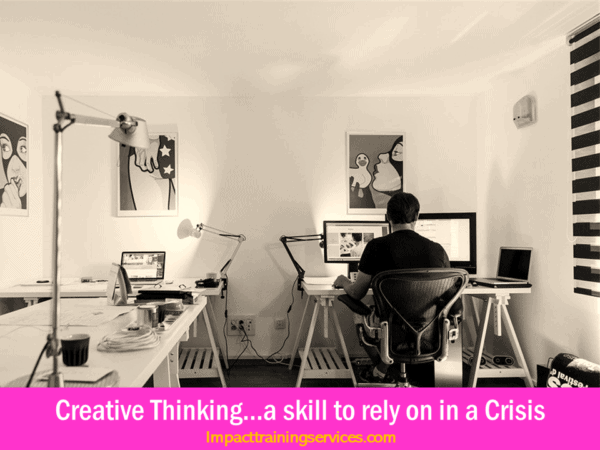
Much as I think this term is overworked, “think outside the box” exactly describes creative thinking.
Please do not start telling me you’re not “creative” or you’re not “artistic.”
If you do, I’m likely to ignore you because creative thinking skills are not so much about being creative, as they are about a means to an end.
You see, simply put, creative thinking is when you can look at a problem or situation from a fresh, less structured perspective. This can widen the number and type of decisions you have to choose from.
I assure you this is a skill you can learn.
In a crisis, creative thinking becomes a strategy for success.
You can draw or write down your ideas. Or let them play around in your head on your daily walk. However you do it, creative thinking skills will help you find and apply the solutions that will solve the problems.
6. Emotional Maturity
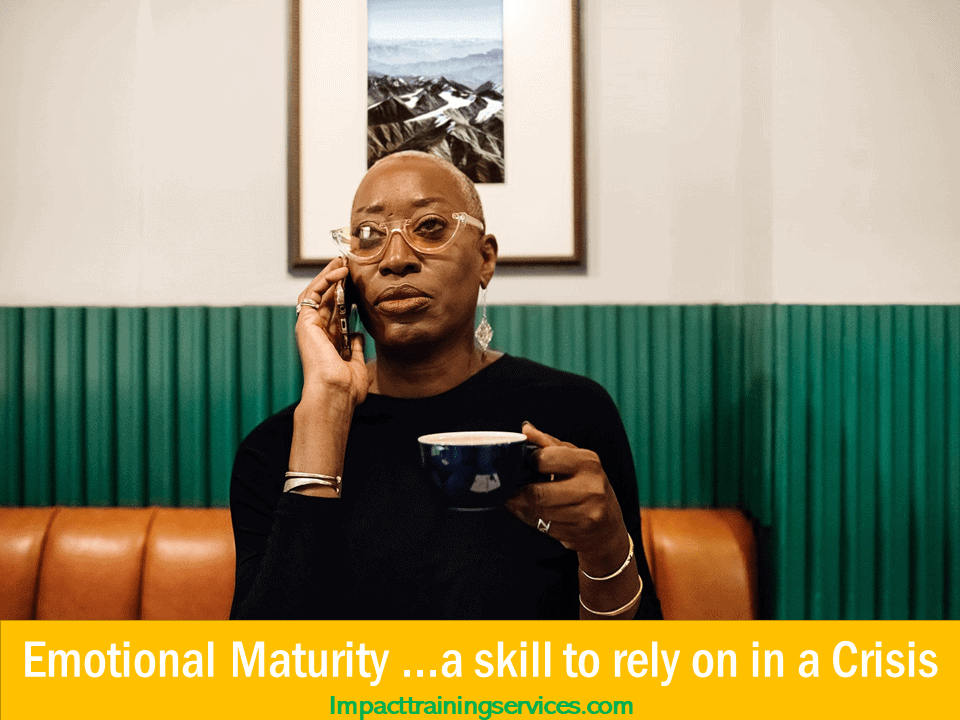
Let me say this upfront…
Emotional Intelligence (EI) and Emotional Maturity (EM) might be two sides of the same coin but they are not necessarily one and the same.
According to Caroline Schmidt Emotional intelligence refers to the ability of a person to manage and control his or her emotions and those of other people as well.
On the other hand, Emotional Maturity means you have the ability to leverage these emotions and apply them to problem-solving and decision-making as necessary.
What does this mean for you in times of crisis? It means:
1. You are capable of being “in the moment” without being reactive or judgmental.
2. You accept responsibility for the situation and remain fully accountable for your actions at all times.
4. When needed, you know how to use assertiveness skills to be strong in every situation
3. In addition, you are likely to be calm, thinking before you speak and you are unlikely to lie in uncomfortable situations. (You should not lie in any situation!)
Those are just a few of the benefits of having emotional maturity skills and depending on them in a crisis.
7. Communication
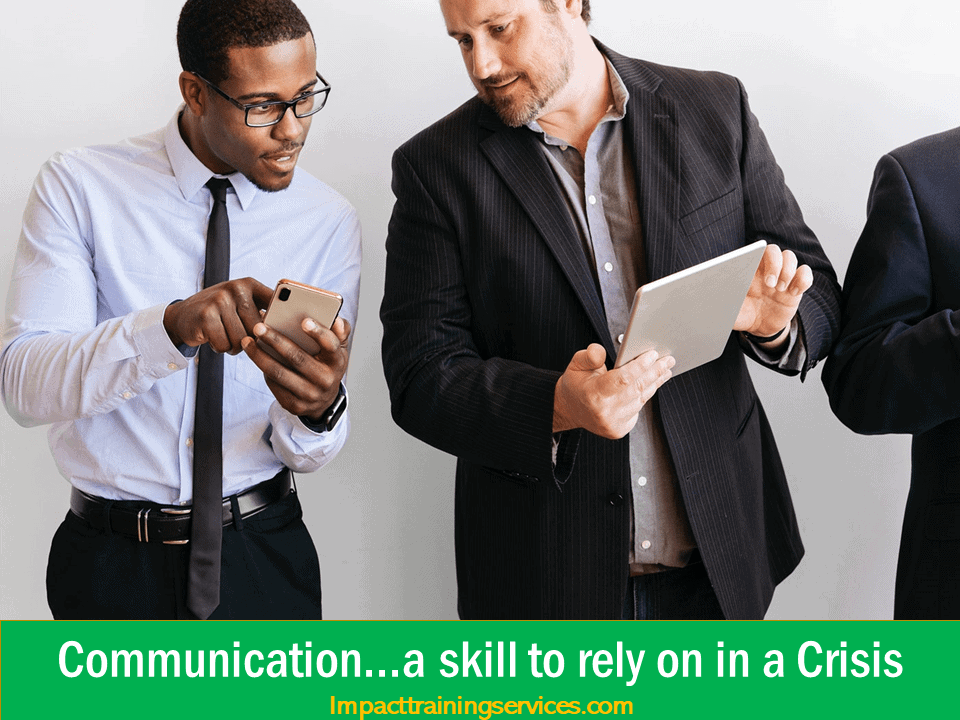
If leadership is the top-level skill, communication must be the foundation or the glue that makes all the other skills work in a crisis.
But not just any old communication, you need effective, crisis communication.
Communicating in this way means that you have the skill to deliver a message that is simple, clear, easily understood and acted upon.
A beautiful example of this is the approach of Lieutenant General Todd Semonite, Chief of Army Corp of Engineers for the US Army.
In discussing how the Army Engineers were changing hotels into temporary hospitals, his communication ticked several the relevant boxes.
You can listen to him here:
Notice he’s clear, he’s specific and he’s only sharing information relevant to the problem.
Notice too, that he has identified the problem clearly and is applying a solution that utilises existing resources.
Your ability to communicate effectively in your day to day operations is a desirable skill. In a crisis, it’s critical.
Your next “crisis skills” step
So I have kept my promise.
I shared 7 business skills that you want to rely on in a crisis. Now I’m passing the baton to you.
Don’t bookmark this post and wait until you find yourself in a crisis situation to rush back to search for it. Without a whole lot of fuss, begin to brush up on these skills right now, if you have to.
How you will share your ideas, listen to feedback and motivate your team to implement the solutions you decide on will determine if your business survive a crisis or not.
These are the skills you need…




